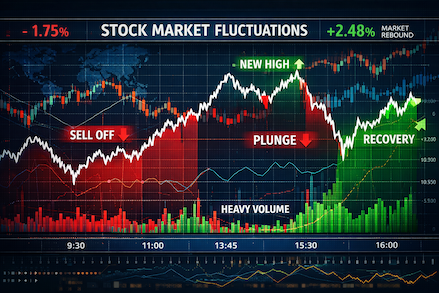Janus Henderson Survey Finds Growing US Political Discord Tops List of Investor Concerns for Next Decade

Concern About Presidential Election Surpasses Inflation, Interest Rate Unease Satisfaction With Financial Advisors High
Janus Henderson Investors today released the findings of its 2024 Investor Survey: Insights for a Brighter Future, which reveal that uncertainty surrounding the upcoming presidential election, economic backdrop and interest rate environment has some investors reducing portfolio risk. Notably, just 42% of investors that were surveyed are very satisfied with their current financial situation – down from 48% a year ago, and two-in-three (67%) believe the cost of living is increasing faster than their income.
“In times like these, all investors should keep in mind that changes to a portfolio designed to avoid short-term volatility can often jeopardize long-term goals,” said Matt Sommer, Head of Specialist Consulting Group at Janus Henderson Investors. “The news cycle is moving at an incredible pace and headlines can be unnerving, but US equities have remained remarkedly resilient in the face of elevated levels of uncertainty.”
Presidential Election a Bigger Concern Than Inflation, Interest Rates
An election year marked by tumultis clearly weighing on the minds of today’s investors, as 78% of survey respondents are concerned about how the upcoming presidential election may impact their financial situation over the next 12 months. In fact, more respondents are concerned about the election than are worried about persistent inflation (70%), high interest rates (57%), poor stock market performance (57%), or a potential recession (55%).
Longer-term (next 10 years), investor concerns are related to broader, systemic domestic and global issues:
· Long-term impact of growing political discord within the U.S. (77%)
· Rising cost of healthcare (67%)
· National debt (66%)
· US-China relations (64%)
Investors Trimming Equity Exposure
During the past 12 months, 33% of survey respondents have shifted assets from equities to cash or fixed income investments and nearly as many investors (32%) say they are planning to shift assets from equities to cash or fixed income investments in the next 12 months. The primary reasons for shifting or planning to shift out of equities include higher interest rates, acting on a recommendation from their advisor, and feeling safer in cash or fixed income.
While nearly half of all respondents (54%) report they are preparing for a recession, this is down from 65% in 2023.
Active Management Remains in Demand
Amid elevated uncertainty, 43% of investors who own mutual funds or ETFs say they prefer an equal mix of active and passive funds in their portfolio, 26% favor active managers, 18% passive managers, 10% have no preference and 3% were unsure.
The areas investors believe represent the best investment opportunities over the next few years include technology (73%), healthcare/biotech (62%), and real estate (38%).
AI Fraud Risk an Established Threat; Financial Advisors Can Help
Nearly three-in-four investors (73%) believe that AI greatly increases the risk of financial exploitation, and 56% are very or somewhat concerned that they or a loved one could fall victim to financial exploitation. Millennials (66%) and members of Generation X (63%) are more likely to be concerned about financial fraud than Baby Boomers (48%) or members of the Silent Generation (43%).[1]
Across all generations, 45% of investors who use a financial advisor report their advisor has already provided them with resources to help avoid financial fraud, 29% would like their advisor to provide these resources and the remaining 26% say they are not interested in these resources.
Sentiment surrounding AI isn’t entirely negative. Among those who use a financial advisor or those who would consider hiring one in the next two years, the majority feel good or neutral about their advisor using AI technology to create educational content (85%) or for administrative tasks (83%). However, over a third (36%) would object to their advisor using AI to make investment recommendations, and an even greater number (44%) would be upset if they learned their advisor used AI to respond to their texts or emails.
Satisfaction With Financial Advisors Soaring
Among investors working with a financial advisor, 67% are very satisfied and 31% are somewhat satisfied with their relationship. Notably, when advisors address emotional needs, client satisfaction improves as the factors associated with higher levels of satisfaction include:
· Advisor provides peace of mind that I’m on track to reach my goals (cited by 79% of “very satisfied” clients)
· Cares about me as a person, beyond just my financial situation (72%)
· Provides financial education (65%)
Nearly half of advised investors (42%) report their advisor is aged 50 years or older, and within this group, 42% said their advisor had addressed the topic of succession planning, 25% did not know their advisor’s plans but would be interested in learning more, and the remaining 32% did not see the need to address this topic.
“Growth-oriented financial advisors should view the challenges facing investors in this era of elevated uncertainty as an opportunity to strengthen their value proposition,” added Sommer. “Clearly, client satisfaction rates are very high among advised investors, however, with many advisors closing in on retirement, those who are able to build trust and differentiate themselves based on providing better client experiences will be rewarded.”
To download a copy of Janus Henderson Investors’ 2024 Investor Survey: Insights for a Brighter Future report, CLICK HERE.
About the Survey
Janus Henderson Investors’ 2024 Investor Survey: Insights for a Brighter Future was conducted by 8 Acre Perspective among 1,000 investors nationwide with $250,000 or more in investable assets. The survey was conducted from April to May 2024.
About Janus Henderson
Janus Henderson Group is a leading global active asset manager dedicated to helping clients define and achieve superior financial outcomes through differentiated insights, disciplined investments, and world-class service. As of June 30, 2024, Janus Henderson had approximately US$361 billion in assets under management, more than 2,000 employees, and offices in 24 cities worldwide. The firm helps millions* of people globally invest in a brighter future together. Headquartered in London, Janus Henderson is listed on the New York Stock Exchange.
*Figure reflects the estimated number of individuals as of year-end 2022 where either their current assets or future benefits are invested in Janus Henderson investment products and is based on JHI’s AUM market share by country, the size of the investing population by country, and average account sizes, using industry and government data and internal estimates.
Source: Janus Henderson Group plc
[1] Millennials (born 1980-1995), Generation X (born 1964-1979), Baby Boomers (born 1945-1963), Silent Generation (born 1925-1944)
Retrouvez l’ensemble de nos articles Business








